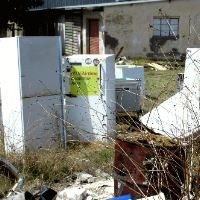(BRUSSELS) – The EU Commission proposed Tuesday new ‘eco-design’ measures to improve the repairability and recyclability of household products such as refrigerators, washing machines, dishwashers and televisions.
The new Ecodesign package includes requirements for repairability and recyclability to improve the life span, maintenance, re-use, upgrade, recyclability and waste handling of appliances.
Besides relying on less energy, the appliances will be easier to fix and, in some cases, safer.
“These measures can save European households on average EUR 150 per year and contribute to energy savings equal to annual energy consumption of Denmark by 2030,” said Commission vice-president Jyrki Katainen.
Eco-design is “a key element in the fight against climate change and a direct contribution to meeting the goals set in the Paris Agreement,” said the EU’s Commissioner for Climate Action Miguel Arias Cañete: “As we move towards our long-term goal of a fully decarbonised EU by 2050, our energy efficiency and eco-design strategy will become ever more important.”
The measures, which were on the whole welcomed by consumer organisations, are expected to bring following benefits for consumers:
- Spare parts will have to be available for 7 to 10 years as a minimum. This makes products more durable and generates less waste.
- Toxic flame retardants will be banned in TV screens, which will push manufacturers to resort to safer alternatives to delay a fire.
- Light bulb flickering will decrease. Repeated exposure to flickering light can affect the nervous system.
- Energy consumption will keep going down, helping consumers not only to save money, but also to minimise their impact on the planet.
The EU executive estimates that the measures, together with new energy labels adopted 11 March, will deliver 167 TWh of final energy savings per year by 2030. This is equivalent to the annual energy consumption of Denmark and corresponds to a reduction of over 46 million tonnes of CO2 equivalent. These measures can save European households on average 150 per year.
The savings come on top of those achieved by the existing eco-design and energy label requirements, which are expected to deliver yearly energy saving of around 150 Mtoe (million tonnes of oil equivalent) by 2020, roughly equivalent to the annual primary energy consumption of Italy.For consumers, this already means an average saving of up to 285 per year on their household energy bills.
Monique Goyens, BEUC’s Director General, director-general of the European Consumer Organisation BEUC, commented:
“The new repair requirements will help improve the lifetime of everyday appliances that currently fail too quickly. It is crucial we bin the current ‘throwaway’ trend, which depletes natural resources and empties consumers’ pockets. It is excellent news that consumers’ health will be better protected, thanks to fewer flickering light bulbs and the removal of harmful flame retardants in TV screens. The EU has started with five products that most consumers own at home and we strongly encourage legislators to make more product categories repairable.”
However, she added that it was a disappointment that consumers will not be able to repair themselves.
“Certain spare parts and maintenance tips will only be available to professional repairers. That means people who are willing to repair by themselves, especially for economic reasons, are going to be left behind. If we want consumers to truly enjoy their right to repair, manufacturers should make repair accessible,” she said.
New ecodesign measures - background guide



